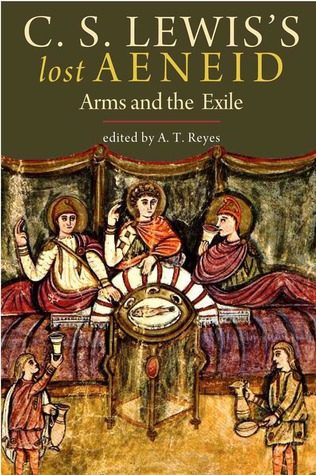- Biblia
- Leer la Biblia
- Versiones de la Biblia
- Verso del dia
- Planes de lectura
- Versos por tema
- Books of the Bible
- Imágenes De La Biblia
- Estudio
- Comentarios
- Concordancias
- Diccionarios bíblicos
- Enciclopedias bíblicas
- Sermones
- Bible Atlas & Maps
- BP Wiki
- Devocionales
- Devocionales de hoy
- Light of the World
- Todos los devocionales
- Inspirational Quotes
- Más
- Picture Quotes
- Videos
- Inspirador
- Estudio Bíblico
- Lo que dice la Biblia
- Bible Q&As
- Daily Bread
- Bible by Genre
- Bible Stories
- Random Bible Verse
- Comunidad
- Store
C. S. Lewis's Lost Aeneid: Arms and the Exile
by C.S. Lewis
C. S. Lewis (1898–1963) is best remembered as a literary critic, essayist, theologian, and novelist, and his famed tales The Chronicles of NarniaThe Chronicles of Narnia and The Screwtape LettersThe Screwtape Letters have been read by millions. Now, A. T. Reyes reveals a different side of this diverse man of letters: translator.
Reyes introduces the surviving fragments of Lewis's translation of Virgil's epic poem, which were rescued from a bonfire. They are presented in parallel with the Latin text, and are accompanied by synopses of missing sections, and an informative glossary, making them accessible to the general reader. Writes Lewis in A Preface to Paradise LostA Preface to Paradise Lost, “Virgil uses something more subtle than mere lengthlength of time…. It is this which gives the reader of the AeneidAeneid the sense of having lived through so much. No man who has read it with full perception remains an adolescent.” Lewis's admiration for the Aeneid Aeneid, written in the 1st century BC and unfolding the adventures of Aeneas, a Trojan who traveled to Italy and became the ancestor of the Romans, is evident in his remarkably lyrical translation.
C. S. Lewis's Lost AeneidC. S. Lewis's Lost Aeneid is part detective story, as Reyes recounts the dramatic rescue of the fragments and his efforts to collect and organize them, and part illuminating look at a lesser-known and intriguing aspect of Lewis's work.
Reyes introduces the surviving fragments of Lewis's translation of Virgil's epic poem, which were rescued from a bonfire. They are presented in parallel with the Latin text, and are accompanied by synopses of missing sections, and an informative glossary, making them accessible to the general reader. Writes Lewis in A Preface to Paradise LostA Preface to Paradise Lost, “Virgil uses something more subtle than mere lengthlength of time…. It is this which gives the reader of the AeneidAeneid the sense of having lived through so much. No man who has read it with full perception remains an adolescent.” Lewis's admiration for the Aeneid Aeneid, written in the 1st century BC and unfolding the adventures of Aeneas, a Trojan who traveled to Italy and became the ancestor of the Romans, is evident in his remarkably lyrical translation.
C. S. Lewis's Lost AeneidC. S. Lewis's Lost Aeneid is part detective story, as Reyes recounts the dramatic rescue of the fragments and his efforts to collect and organize them, and part illuminating look at a lesser-known and intriguing aspect of Lewis's work.
BUY NOW
Hardcover, 184 pages
Published May 3rd 2011 by Yale University Press (first published April 26th 2011)
Suscribir
© 2025 Bibleportal.com Reservados todos los derechos.

Clive Staples Lewis was born in Ireland, in Belfast on 29 November 1898. His mother was a devout Christian and made efforts to influence his beliefs. When she died in his early youth her influence waned and Lewis was subject to the musings and mutterings of his friends who were decidedly agnostic and atheistic. It would not be until later, in a moment of clear rationality that he first came to a belief in God and later became a Christian.
C. S. Lewis volunteered for the army in 1917 and was wounded in the trenches in World War I. After the war, he attended university at Oxford. Soon, he found himself on the faculty of Magdalen College where he taught Mediaeval and Renaissance English.
Throughout his academic career he wrote clearly on the topic of religion. His most famous works include the Screwtape Letters and the Chronicles of Narnia. The atmosphere at Oxford and Cambridge tended to skepticism. Lewis used this skepticism as a foil. He intelligently saw Christianity as a necessary fact that could be seen clearly in science.
"Surprised by Joy" is Lewis's autobiography chronicling his reluctant conversion from atheism to Christianity in 1931.
... Show more